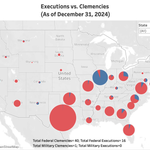Overview
All states and the federal government have a process for lowering the sentence or pardoning those facing criminal charges. Clemency is an especially important consideration for those on death row. Even after all legal appeals in the courts have been exhausted, there is still a possibility that a prisoner’s life will be spared.
Clemencies in individual capital cases are rare, but there have been a number of blanket grants of clemency by governors and one by President Joseph Biden which express concern about systemic problems and the overall fairness of the death penalty. A 2025 study by DPI of individual clemencies examined the reasons cited when granting clemency. Mitigating factors was the most often cited reason, in nearly a third of all cases, closely followed by concerns about comparative culpability or excessive sentence, possible wrongful conviction, and official misconduct or unfair legal practices.
At Issue
Because the power of clemency is vested in the executive branch of the government, courts have been reluctant to impose standards on this procedure. Governors are elected; thus the process may be highly political. For these reasons, clemencies in death penalty cases are difficult to predict and immune from judicial review.
Grants of Clemency by State
What DPIC Offers
DPIC keeps track of all clemencies granted in capital cases in the modern era by state and year, including the reasons given for the action. It also has compiled material on historical uses of clemency. Finally, DPIC describes the differences among state laws regarding who makes the clemency decision and any constraints on the process.
Although a reprieve is technically a type of clemency, this page discusses only executive acts with permanent effects on a defendant’s conviction or sentence. Temporary holds on executions are tracked on our Outcome of Death Warrants pages.
News & Developments
News
Aug 11, 2025
Business Leader Calls for End to California’s “Broken” Death Penalty System

A prominent business executive and member of a larger coalition of over 500 global business leaders is calling on California Governor Gavin Newsom to commute all death sentences in California to life without parole. In a July 2025 op-ed, Matthew Stepka, a member of Business Leaders Against the Death Penalty, calls California’s death penalty system a failure of both justice and fiscal responsibility. > “If any company or product I evaluated had an error rate…
Read MoreNews
Mar 03, 2025
Alabama Governor Grants Clemency to Robin ‘Rocky’ Myers, Sparing Him from Execution
On February 28, 2025, Alabama Governor Kay Ivey commuted the death sentence of Robin‘Rocky’ Dion Myers to Life Without Parole (LWOP). Myers was convicted in the 1991 murder of Ludie Mae Tucker in Decatur, Alabama. His jury recommended that he be sentenced to LWOP, but the judge in his case overrode the jury’s recommendation and handed down a death sentence. The practice of judicial override was abolished in Alabama in 2017. In her statement, Gov. Ivey repeated her…
Read MoreNews
Jan 02, 2025
In Wake of President Biden’s Federal Commutations, North Carolina Governor Cooper Grants Clemency to 15 Death-Sentenced Prisoners, the Largest Grant of Capital Clemency in State History
Governor…
Read MoreNews
Dec 09, 2024
Religious Groups, Former Corrections Officials, Pro-life Voices, and Many Others Urge President Biden to Commute Federal Death Sentences
In letters released on December 9, 2024, hundreds of stakeholders urged President Joe Biden (pictured) to commute all federal death sentences before his term ends, citing racial bias, systemic arbitrariness, and the failure of the federal death penalty to enhance public safety. This collective request reflects broad, bipartisan acknowledgement of the flaws in the capital punishment system and aligns with the national downward trend of support for the death…
Read MoreNews
Nov 27, 2024
Biden Contemplates Federal Commutation Requests
Turkeys“Peach” and“Blossom” outside of…
Read More



